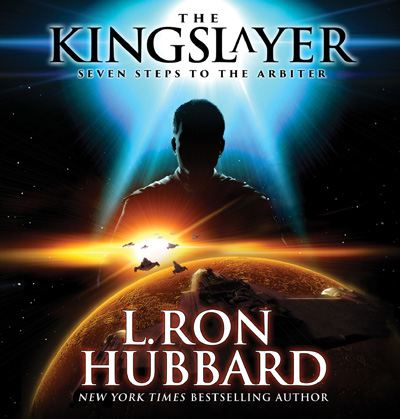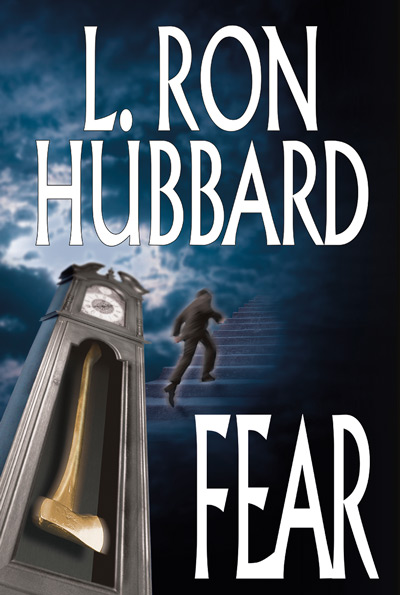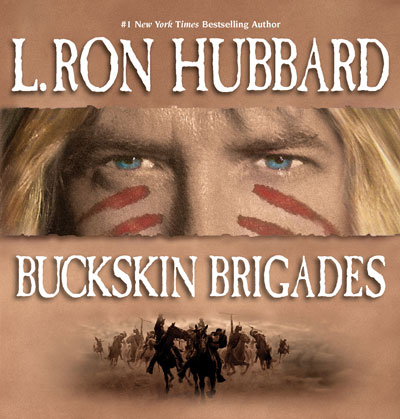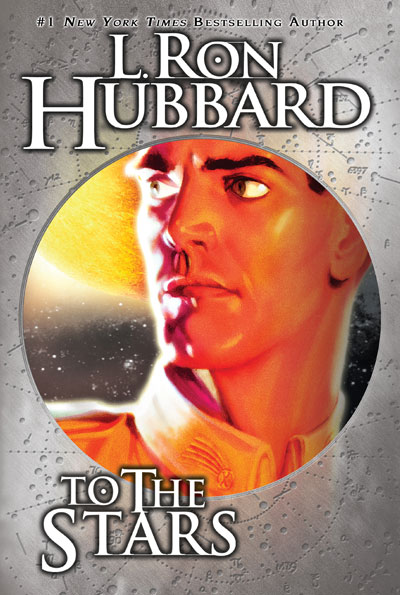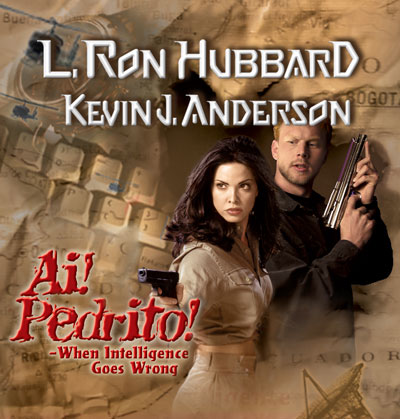Renowned throughout the universe…
A star among the stars…
A timeless hero whose time is now…
Ole Doc Methuselah is his name, and saving the universe is his game.
He may be a touch absent-minded, a tad disorganized, with a slight tendency to lose all perspective in the presence of an attractive woman… but when it comes to saviors of the universe, you take what you can get.
And what you get with Ole Doc Methuselah—the most famous member of the most elite organization in the universe, the Soldiers of Light—is action, spectacle, mystery, and plenty of laughs along the way.
With his razor-sharp scalpel, hypodermic needles, and doctor’s bag of tricks, he journeys to the far corners of the cosmos, vowing to cut out the corruption, confront the cruelty, and contain the warped psychology that plagues mankind—and all other kinds out there.
Yes, there is intelligent life in the universe after all. You’ll find it in Ole Doc Methuselah. So if you’re looking for an adventure to remember, this is just what the doctor ordered.
“Classic adventures by a classic writer.” —Roger Zelazny
ABOUT THE AUTHOR
A series of seven stories about the most famous Soldier of Light, collectively entitled “Ole Doc Methuselah.”
The first of the series, entitled “Ole Doc Methuselah” appeared in the October 1947 issue of Astounding. But with the conclusion of the 3-part novel “The End Is Not Yet” running prominently in the same issue under the L. Ron Hubbard byline, editor John Campbell wanted to avoid creating the impression that one writer dominated the entire magazine. And so, the pen name Rene Lafayette was affixed to the series.
The result was remarkable. Campbell later reported that L. Ron Hubbard had, indeed, successfully competed with—and bested—himself in the magazine’s reader-response poll: Lafayette’s “Ole Doc Methuselah” was voted the most popular story in the issue with L. Ron Hubbard’s “The End Is Not Yet” placing just behind it.
All seven stories in the series would appear in Astounding between October 1947 and January 1950. The other stories are: “The Expensive Slaves;” “Her Majesty’s Aberration;” “The Great Air Monopoly;” “Plague;” “A Sound Investment” and “Ole Mother Methuselah.”
Chapter One
Ole Doc Methuselah wasn’t thinking what he was doing or he never would have landed on Spico that tempestuous afternoon. He had been working out some new formulas for cellular radiation—in his head as usual, he never could find his log tables—and the act of also navigating his rocket ship must have been an unconcious too much for him. He saw the asteroid planet, de-translated his speed and landed.
He sat there for some time at the controls, gazing out into the pleasant meadow and at the brook which wandered so invitingly upon it, and finishing up his tabulations.
When he had written down the answer on his gauntlet cuff—his filing system was full of torn scraps of cuffs—he felt very pleased with himself. He had mostly forgotten where he had been going, but he was going to pour the pile to her when his eye focused upon the brook. Ole Doc took his finger off the booster switch and grinned.
“That sure is green grass,” he said with a pleased sigh. And then he looked up over the control panels where he hung his fishing rod.
Lord knows what would have happened to Junction City if Ole Doc hadn’t decided to go fishing that day.
Seated on the lower step of the port ladder, Hippocrates patiently watched his god toss flies into the water with a deft and expert hand. Hippocrates was a sort of cross between several things. Ole Doc had picked him up cheap at an auction on Zeno just after the Trans-System War. At the time he had meant to discover some things about his purchase, such as his metabolism and why he dieted solely on gypsum, but that had been thirty years ago and Hippocrates had been an easy habit to acquire. Unpigmented, four-handed and silent as space itself, Hippocrates had set himself the scattered task of remembering all the things Ole Doc always forgot. He sat now, remembering—particularly that Ole Doc had some of his own medicine to take at thirty-six o’clock—and he might have sat there that way for hours and hours, phonograph-recordwise, if a radiating pellet hadn’t come with a sharp zip past his left antenna to land with a clang on the Morgue’s thick hull.
ZIP! CLANG!
Page forty-nine of the Tales of the Early Space Pioneers went smoothly into operation in Hippocrates’ gifted if unimaginative skull, which page translated itself into unruffled action.
He went inside and threw on Force Field Beta minus the Nine Hundred and Sixtieth Degree Arc, that being where Ole Doc was. Seeing that his worshiped master went on fishing, either unwitting or uncaring, Hippocrates then served out blasters and twenty rounds to himself and went back to sit on the bottom step of the port ladder.
The big spaceship—dented a bit, but lovely—simmered quietly in Procyon’s inviting light and the brook rippled and Ole Doc kept casting for whatever outrageous kind of fish he might find in that stream. This went on for an hour and then two things happened. Ole Doc, unaware of the force field, cast into it and got his fly back into his hat and a young woman came stumbling, panic-stricken, across the meadow toward the Morgue.
From amongst the stalks of flowers some forty feet high emerged an Earthman, thick and dark, wearing the remains of a uniform to which had been added civil space garb. He rushed forward a dozen meters before he paused in stride at the apparition of the huge golden ship with its emblazoned crossed ray rods of pharmacy. Then he saw Ole Doc fishing and the pursuer thrust a helmet up from a contemptuous grin.
It was nearer to Ole Doc than to the ship, and the girl, exhausted and disarrayed, stumbled toward him. The Earthman swept wide and put Ole Doc exactly between himself and the ladder before he came in.
Hippocrates turned from page forty-nine to page one hundred and fifteen. He leaped nimbly up to the top of the ship in the hope of shooting the Earthman on an angle which would miss Ole Doc. But he had no more than arrived and sighted before it became apparent to him that he would also now shoot the girl. This puzzled him. Obviously the girl was not an enemy who would harm Ole Doc. But the Earthman was. Still, it was better to blast girl and Earthman than to see Ole Doc harmed in any cause. The effort at recalling an exact instance made Hippocrates tremble and in that tremble Ole Doc also came into his fire field.
Having no warnings whatever, Ole Doc had just looked up from disentangling his hook from first his shirt and then his thumb and beheld two humans cannonading down upon him.
The adrenalized condition of the woman was due to the Earthman, that was clear. The Earthman was obviously a blast-for-hire from some tough astral slum and he had recently had a fight, for two knuckles bled. The girl threw herself in a collapse at Ole Doc’s feet and the Earthman came within a fatal fifteen feet.
Ole Doc twitched his wrist and put his big-hooked fly into the upper lip of the Earthman. This disappointed Ole Doc a little for he had been trying for the nose. The beggar was less hypothyroid than he had first estimated.
Pulling his game-fish bellowing into the stream, Ole Doc disarmed him and let him have a ray barrel just back of the medulla oblongata—which took care of the fellow nicely.
Hippocrates lowered himself with disappointed grunts down to the ladder. At his master’s hand signal he came forth with two needles, filled, sterilized and awaiting only a touch to break their seals and become useful.
Into the gluteal muscle—through clothes and all, because of sterilizing radiation of the point—Ole Doc gave the Earthman the contents of needle one. At the jab the fellow had squirmed a little and the doctor lifted one eyelid.
“You are a stone!” said Ole Doc. “You can’t move.”
The Earthman lay motionless, wide-eyed, being a stone. Hippocrates carefully noted the time with the fact in order to remind his master to let the fellow stop being a stone sometime. But in noting the time, Hippocrates found that it was six minutes to thirty-six o’clock and therefore time for a much more important thing—Ole Doc’s own medicine.
Brusquely, Hippocrates grabbed up the unconscious girl and waded back across the stream with her. The girl could wait. Thirty-six o’clock was thirty-six o’clock.
“Hold up!” said Ole Doc, needle poised.
Hippocrates grunted and kept on walking. He went directly into the main operating room of the Morgue and there amidst the cleverly jammed hotchpotch of trays and ray tubes, drawers, masks, retorts and reflectors, he unceremoniously dropped the girl. Monominded now, for this concerned his master—and where the rest of the world could go if it interfered with his master was a thing best expressed in silence—Hippocrates laid out the serum and the proper rays.
Humbly enough, the master bared his arm and then exposed himself—as a man does before a fireplace on a cold day—to the pouring out of life from the fixed tubes. It took only five minutes. It had to be done every five days.
Satisfied now, Hippocrates boosted the girl into a proper position for medication on the center table and adjusted a lamp or two fussily, while admiring his master’s touch with the needle.
Ole Doc was smiling, smiling with a strange poignancy. She was a very pretty girl, neatly made, small waisted, high breasted. Her tumbling crown of hair was like an avalanche of fire in the operating lights. Her lips were very soft, likely to be yielding to—
“Father!” she screamed in sudden consciousness. “Father!”
Ole Doc looked perplexed, offended. But then he saw that she did not know where she was. Her wild glare speared both master and thing.
“Where is my father?”
“We don’t rightly know, ma’am,” said Ole Doc. “You just—”
“He’s out there. They shot our ship down. He’s dying or dead! Help him!”
Hippocrates looked at master and master nodded. And when the servant left the ship it was with a bound so swift that it rocked the Morgue a little. He was only a meter tall, was Hippocrates, but he weighed nearly five hundred kilos.
Behind him came Ole Doc, but their speeds were so much at variance that before the physician could reach the tall flowers, Hippocrates was back through them carrying a man stretched out on a compartment door wrenched from its strong hinges for the purpose. That was page eight of First Aid in Space, not to wrestle people around but to put them on flat things. Man and door weighed nearly as much as Hippocrates but he wanted no help.
“‘Lung burns,”’ said Hippocrates, “‘are very difficult to heal and most usually result in death. When the heart is also damaged, particular care should be taken to move the patient as little as possible since exertion. . . .”’
Ole Doc listened to, without heeding, the high, squeaky singsong. Walking beside the girl’s father, Ole Doc was not so sure.
He felt a twinge of pity for the old man. He was proud of face, her father, gray of hair and very high and noble of brow. He was a big man, the kind of a man who would think big thoughts and fight and die for ideals.
The doctor beheld the seared stains, the charred fabric, the blasted flesh which now composed the all of the man’s chest. The bloody and gruesome scene was not a thing for a young girl’s eyes, even under disinterested circumstances—and a hypo would only do so much.
He stepped to the port and waved a hand back to the main salon. There was a professional imperiousness about it which thrust her along with invisible force. Out of her sight now, Ole Doc allowed Hippocrates to place the body on the multi-trayed operating table.
Under the gruesome flicker of ultraviolet, the wounded man looked even nearer death. The meters on the wall counted respiration and pulse and hemoglobin and all needles hovered in red while the big dial, with exaggerated and inexorable calm, swept solemnly down toward black.
“He’ll be dead in ten minutes,” said Ole Doc. He looked at the face, the high forehead, the brave contours. “He’ll be dead and the breed is gone enough to seed.”
At the panel, the doctor threw six switches and a great arc began to glow and snap like a hungry beast amid the batteries of tubes. A dynamo whined to a muted scream and then another began to growl. Ozone and brimstone bit the nostrils. The table was pooled in smoky light.
The injured man’s clothing vanished and, with small tinks, bits of metal dropped against the floor—coins, buckles, shoe nails.
Ole Doc tripped another line of switches and a third motor commenced to yell. The light about the table graduated from blue up to unseen black. The great hole in the charred chest began to glow whitely. The beating heart which had been laid bare by the original weapon slowed, slowed, slowed.
With a final twitch of his wrist, Ole Doc cut out the first stages and made his gesture to Hippocrates. That one lifted off the top tray which bore the man and, holding it balanced with one hand, opened a gravelike vault. There were long green tubes glowing in the vault and the feel of swirling gases. Hippocrates slid the tray along the grooves and clanged the door upon it.
Ole Doc stood at the board for a while, leaning a little against the force field which protected him from stray or glancing rays, and then sighing a weary sigh, evened the glittering line. Normal light and air came back into the operating room and the salon door slid automatically open.
The girl stood there, tense question in her every line, fear digging nails into palms.
Ole Doc put on a professional smile. “There is a very fair chance that we may save him, Miss—”
“Elston.”
“A very fair chance. Fifty-fifty.”
“But what are you doing now?” she demanded.
Ole Doc would ordinarily have given a rough time to anyone else who had dared to ask him that. But he felt somehow summery as he gazed at her.
“All I can, Miss Elston.”
“Then he’ll soon be well?”
“Why . . . ah . . . that depends. You see, well . . .” How was he going to tell her that what he virtually needed was a whole new man? And how could he explain that professional ethics required one to forgo the expedience of kidnapping, no matter how vital it might seem? For what does one do with a heart split in two and a lung torn open wide when they are filled with foreign matter and ever-burning rays unless it is to get a new chest entire?
“We’ll have to try,” he said. “He’ll be all right for now. . . for a month, or more perhaps. He is in no pain, will have no memory of this and if he is ever cured, will be cured entirely. The devil of it is, Miss Elston, men always advance their weapons about a thousand years ahead of medical science. But then, we’ll try. We’ll try.”
And the way she looked at him then made it summer entirely. “Even . . .” she said hesitantly, “even if you are so young, I have all the confidence in the universe in you, Doctor.”
That startled Ole Doc. He hadn’t been patronized that way for a long, long time. But more important—he glanced into the mirror over the table. He looked more closely. Well, he did look young. Thirty, maybe. And a glow began to creep up over him, and as he looked back to her and saw her cascading glory of hair and the sweetness of her face—
“Master Doctor!” interrupted the unwelcome Hippocrates. “The Earthman is gone.”
Ole Doc stared out the port and saw thin twirls of smoke arising from the charred and blasted grass. The Earthman was gone all right, and very much gone for good. But one boot remained.
“Looks,” said Ole Doc, “like we’ve got some opposition.”
Ole Doc Methuselah Glossaries
abattoir: slaughterhouse; a facility where farm animals are killed and processed into meat products. Used figuratively.
Algol System: a three-star system in the constellation Perseus located in the northern hemisphere, approximately 92.8 light-years from Earth. The brightest star, Algol, known as the “Demon Star,” has also been called the “Blinking Demon” due to the fact that every 68.75 hours its light dims rather suddenly for several hours before returning just as quickly to its former brightness, a change that can be seen with the naked eye. This phenomena is caused when Algol is eclipsed by the dimmer secondary star (Algol B) as it passes in front of the brighter star once per orbit; thus the light reaching Earth is temporarily decreased.
alkaloid: a member of a large group of chemicals that are made by plants and have nitrogen in them, used in medicines, drugs or as a poison. Alkaloids include cocaine, nicotine, caffeine and morphine.
alpha: alpha particle; a radioactive particle made up of two protons and two neutrons. These particles are created by the decay of a radioactive material.
Alpha Centauri: the triple-star system that is closest to the Earth.
Apocalypse: the final destruction of the world as described in the biblical Book of Revelation (the last book in the New Testament). The Four Horsemen of the Apocalypse are personified as plague, war, famine and death, sent as harbingers of the end of the world.
asepsis: the state of being free of disease-carrying organisms.
avec: (French) with.
backwash: isolated, secluded or backward.
Benadryl: a medication used to treat allergies.
Beta: the fifth brightest star in Ursa Major and also one of the “Pointers” that leads the way to Polaris, the North Star. It is located seventy-nine light years from Earth.
blue-sky: having dubious value; not financially sound.
Boccaccio: Giovanni Boccaccio (1313–1375), Italian poet and writer whose classic work, the Decameron (1348–1353), is a collection of 100 tales set against the melancholic background of the Black Death. The Decameron, which means “ten days,” is a fictional account of ten young people who flee from plague-ridden Florence to a country manor, and begin telling stories to keep themselves occupied and diverted from the tragedy they have fled. Ten days pass and each refugee tells one story, every day, making a total of 100 different tales. The stories explore a wide range of moral, social and political issues with candor and wit.
bos’n: bosun; a ship’s officer in charge of the supervision and maintenance of the ship and its equipment.
bravo: a daring villain; one who defies law.
bucko: a person who is domineering and bullying.
buncombe: hogwash, especially ludicrously false statements; bunk. The term arose in 1820 during a debate in Congress from the Representative of Buncombe County, North Carolina who gave a long rambling speech with little relevance to the current debate and refused to yield the floor. He informed his colleagues that his speech was not intended for Congress, and confessed that it was only made because his electors expected it, and that he was “speaking for Buncombe.”
calcine: to reduce or dry (a substance) by roasting or strong heat.
centrifuge: a machine that separates substances of different densities by rotating the sample at very high speed.
chandlery: commodities sold by a retailer who deals in specified goods or equipment.
chief warrant bos’n: chief warrant officer bosun. The bosun in charge of the deck crew holding the rank of chief warrant officer. The bosun uses a pipe (whistle-like device) to communicate orders via different arrangements of notes. The pipe is used during ceremonial honors when officers or officials board or leave a ship.
colloid: colloid cancer; a cancer characterized by excessive production of mucus-producing cancer cells.
comptometer: a type of mechanical or electromechanical adding machine. Although it was designed primarily for adding, it could also do division, multiplication and subtraction. Special comptometers with varying key arrays (with from thirty to well over one hundred keys) were produced for a variety of purposes, including calculating currencies, time and measures of weight. In the hands of a skilled operator, the comptometer was faster to use than electronic calculators and remained in use into the 1990s. The name is apparently from a blend of “compute” and “meter” meaning measure.
cycle, ten-to-thirteen: range of sound vibrations measured by the number of cycles of a (sound) wave per second. The frequency of sounds lies in the range of 20–20,000 cycles per second, and anything below 20 cycles per second cannot be heard by the human ear.
dynamo: a machine by which mechanical energy is changed into electrical energy; a generator.
ephedrine: a drug that opens the air passages, used in the treatment of asthma.
eugenicized: to produce genetic qualities or features by controlled selective breeding.
fop: a foolish person.
G: gravity; a unit of acceleration equal to the acceleration of gravity at the Earth’s surface.
gorget: an ornamental collar.
governor: a mechanism on an engine which automatically restricts the speed.
Graves’ disease: a disease that causes hyperactivity of the thyroid gland, a gland that helps set the rate of metabolism. When the thyroid is too active, it makes more thyroid hormones than the body needs and can cause weight loss, rapid heart rate and nervousness leading to heart problems and death. Named for the Irish doctor Robert James Graves who described it in 1835.
griffin: a legendary creature with the body of a lion and the head and wings of an eagle. As the lion was traditionally considered the king of the beasts and the eagle the king of the birds, the griffin was thought to be an especially powerful and majestic creature, and a guardian of the divine.
grog shop: a cheap tavern where alcoholic drinks are served.
gypsum: a common white or colorless mineral used to make cements and plaster, especially plaster of Paris.
gyro: gyroscope; an apparatus consisting of a rotating wheel so mounted that its axis can turn freely in certain or all directions, and capable of maintaining the same absolute direction in space in spite of movements of the mountings and surrounding parts; used to maintain equilibrium, determine direction, etc.
Harun al-Rashid: (766–809) fifth caliph of Baghdad (786–809). He is best remembered, however, as a central character in The Arabian Nights where he is portrayed as the epitome of the learned and just ruler. He often traveled about the city at night in disguise to learn firsthand the condition of his people.
helio motor: a motor run by energy from the sun.
hoist by his own petard: literally “to be blown up by one’s own bomb” or to have a situation of one’s own doing lead to one’s downfall. The line comes from Shakespeare’s Hamlet, “For ’tis sport to have the engineer / Hoist with his own petard.…” Hamlet finds his childhood comrades, Rosencrantz and Guildenstern, are plotting to have him killed. Hamlet turns the plot on them by substituting their names for his in the death warrant they carry from King Claudius. He goes on to say, “But I will delve one yard below their mines / And blow them at the moon.” The mines he speaks of are land mines or petards, small explosive devices designed to blow open barricaded doors and gates, a favorite weapon in Elizabethan times. Hamlet is saying, figuratively, that he would bury his bomb beneath Rosencrantz and Guildenstern and “hoist” them, that is, “blow them at the moon.”
humpy: (British slang) annoyed.
hypothyroid: affected by a deficiency in the activity of the thyroid gland, characterized by a lowered metabolic rate and general loss of vigor or sluggishness. Used humorously.
jig time, in: rapidly; in no time at all.
jingoist: extreme patriotism in the form of aggressive foreign policy. It refers to sections of the general public who advocate the use of threats of or actual force against other countries in order to safeguard what they perceive as their country’s national interests. The term comes from the chorus of a song commonly sung in pubs and music halls at the turn of the twentieth century:
We don’t want to fight but by Jingo if we do,
We’ve got the ships, we’ve got the men, we’ve got the money too,
We’ve fought the Bear before, and while we’re Britons true,
The Russians shall not have Constantinople.
Johns Hopkins: Johns Hopkins University, founded in 1876, located in Baltimore, Maryland, is the first American research university and is particularly regarded for its hospital and schools of medicine. Named for Johns Hopkins who left $7 million in his will for the foundation of the university, it has the stated goal of “The encouragement of research … and the advancement of individual scholars, who by their excellence will advance the sciences they pursue, and the society where they dwell.”
lingua: any hybrid language used for communication between different peoples.
log table: a table of common logarithms. A logarithm of a given number to a given base is the power to which you need to raise the base in order to get the number. For example, the logarithm of 1,000 to the common base 10 is 3 (10 x 10 x 10 = 1,000). Before the invention of calculators, the only alternative to slide rules was to use tables of logarithms that showed conversions of numbers into logarithms and vice versa, saving work in laborious calculations by hand on paper.
Malory: Sir Thomas Malory, English author, wrote Le Morte d’Arthur, one of the most popular prose romances about the medieval period. The book was the first full-length book in English about the adventures of King Arthur and the Knights of the Round Table.
manumission: a formal written act to free slaves.
manumitting: releasing from slavery or servitude.
Marzo: the month of March.
Mizar: a double star (two stars that revolve around each other under their mutual gravitation) in Ursa Major (the Big Dipper).
Muses: (Greek mythology) any of the nine daughters of Zeus (king of the gods) and Mnemosyne (goddess of memory), each of whom preside over a different art or science. The nine Muses and their specialties are traditionally: Calliope (epic poetry), Clio (history), Erato (love poetry, lyric art), Euterpe (music), Melpomene (tragedy), Polyhymnia or Polymnia (hymns, sacred songs), Terpsichore (dance), Thalia (comedy) and Urania (astronomy).
neurasthenia: a condition marked by chronic mental and physical fatigue and depression.
ODM: Ole Doc Methuselah.
OOD: officer of the deck; officer on duty in charge of the ship representing the commanding officer.
pharmacopeia: a book published usually under the jurisdiction of the government and containing a list of drugs, their formulas, methods for making medicinal preparations, requirements and tests for their strength and purity and other related information.
pill roller: a health professional trained in the art of preparing and dispensing drugs.
pinked: to stab lightly with a pointed weapon; prick.
pipe: to play on a pipe, a distinctive silver whistle used by the bosun during ceremonious greeting for important officers and officials as they come aboard or leave a ship.
powder magazine: a compartment for the storage of ammunition and explosives.
Procyon: Procyon System; a system of two stars that revolve around each other under their mutual gravitation, located approximately 11.5 light-years from Earth.
ragweed pollen: any of a number of weedy composite herbs that produce a pollen that is a frequent cause of allergies.
Rappaccini’s Daughter: a novel written in 1844 by Nathaniel Hawthorne (1804–1864), American novelist and short story writer. His work includes The Scarlet Letter (1850) and The House of the Seven Gables (1851). He was one of the leading writers of his time, moving away from formalism and exploring the ideas of individual responsibility, the importance of creative expression and man’s relationship to the natural world.
rheumatic heart: condition in which the heart valves are damaged by rheumatic fever, an infectious disease which is characterized by fever and joint pain.
Rotarian club: a club of business and professional men devoted to serving the community and promoting world peace.
sgt: sidereal galaxy time.
sideboys: sailors stationed to form a human passageway for distinguished visitors, officers or officials to pass through when arriving or departing a ship, plus an officer who pipes them (makes a call with a special whistle called a pipe) as they board or leave. The number of sailors varies from two to ten, depending on the rank of the visitor.
sidereal galaxy time: time determined by or from the stars. “Sidereal time” is time measured on Earth with respect to the stars, rather than the sun. Thus, “sidereal galaxy time” would be time measured in a galaxy with respect to the stars in that system.
Sirius: the brightest star in the nighttime sky, Sirius is a white dwarf star (what a star like our sun becomes after it has exhausted its nuclear fuel and is near the end of its nuclear burning stage) that has twenty-two times the brightness of the sun.
Spica: the brightest star in the constellation Virgo, and the fifteenth brightest star in the nighttime sky. It is 260 light-years distant from Earth.
swill parlor: a place, such as a tavern or bar, where beer is sold.
texas: the structure on a ship containing the pilothouse and the officers’ quarters, so called because steamboat cabins were named after states. At one time Texas was the largest state, and as the officers’ quarters were the largest, they were called texas.
trice, in a: a very short time; an instant; a moment.
UMS: Universal Medical Society.
Ursa Major: a constellation in the polar region of the Northern Hemisphere. Ursa Major, which means “the Great Bear,” contains the seven stars that form the Big Dipper.
UT: Universal Time.
Vega: the brightest star in the northern constellation Lyra, and the third brightest in Earth’s northern hemisphere. It is 25.3 light-years distant from Earth.
washboard weepers: radio lingo from the 1940s for soap operas.






